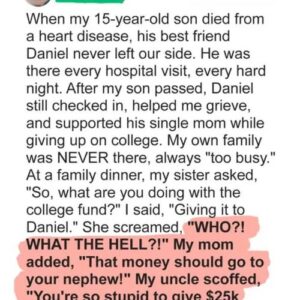Michelle and I had been together for a year. After five long years of navigating life alone since my wife’s untimely death, finding someone who felt like a future worth investing in was no small feat. So, meeting Michelle’s son had been a big milestone I’d been waiting for.
Finally, yesterday, Michelle decided the time was right. We met for lunch at a quaint café that boasted a nice mix of rustic charm and the aroma of fresh coffee. Michelle’s son, Jack, was 15—a stage in life known for its delicate blend of adolescent rebellion and confusing emotions. I hoped our meeting would go smoothly, but I braced myself for a challenge.
Jack was distant from the start. When we shook hands, he barely made eye contact, his gaze instead locked onto the tablecloth as if it held all the secrets of the universe. The conversation was stilted, and I could feel every word I spoke getting tangled in an invisible web of discomfort.
To my dismay, Jack and Michelle slipped into French mid-meal. It was clear Jack wasn’t trying to impress; rather, he was actively excluding me. I clenched my jaw, remembering the days of my childhood French classes, imposed upon me by my well-meaning mother. Despite my attempts to block out the language, I understood enough to catch snippets of their conversation.
Jack: (in French) “Mom, you still haven’t told him?”
Michelle: “Honey, I will.”
Jack: “Don’t mess with his mind. He’s a nice guy, and he needs to know what he’s getting into. Tell him that you’re…”
The conversation trailed off as Michelle looked up, panic flashing across her face. She quickly shifted the subject, forcing a smile. I could see the tension in her eyes and knew something was amiss. I pretended not to notice, though the seed of suspicion had been firmly planted.
After the meal, as we walked to the car, Jack sulked in the backseat, his earlier hostility replaced by a brooding silence. I caught Michelle’s gaze in the rearview mirror, and she looked like she was waging an internal battle. The ride home was quiet, the hum of the engine only highlighting the awkwardness.
Once we arrived at my apartment, Michelle and I sat down on the couch, the weight of her earlier words hanging in the air. I had to know what Jack had been talking about. With a gentle but firm tone, I said, “Michelle, I heard part of what you and Jack were talking about. Is there something I need to know?”
Her face turned pale, and she took a deep breath before speaking. “There’s something I should have told you sooner. I didn’t want to burden you, and I thought I could handle it in my own time. But Jack is right. There’s a reason I wanted to keep you away from my son until now.”
I braced myself. “What is it?”
Michelle’s voice trembled as she continued. “I have a condition—one I haven’t shared with anyone. I’m managing it, but it’s not something I wanted to reveal until I was sure about us. It’s a rare neurological disorder, and it affects my memory and balance. I didn’t want to scare you off or have you pity me.”
A lump formed in my throat as I processed her words. The revelation was unexpected, but it explained a lot—the small, unexplained moments when Michelle seemed off-balance or struggled to remember things.
“Michelle,” I said softly, taking her hand in mine, “I’m sorry for whatever discomfort my presence might have caused you. But I want you to know that whatever challenges we face, I’m here with you. And if this is something you’re dealing with, we’ll face it together.”
Tears welled up in her eyes, and she nodded, a relieved smile breaking through. “Thank you. I just needed to be honest with you. I didn’t want to hide anything anymore.”
As we embraced, I realized that despite the awkward introduction and the uncomfortable moments, Michelle and I had reached a new level of understanding. Jack’s unintended exposure had forced Michelle’s hand, but it had also opened the door to a deeper connection between us. We faced an uncertain future, but we would face it together, strengthened by the honesty that now bound us.





